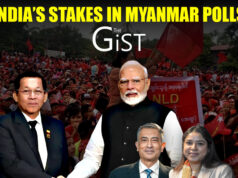They are tiny, rich and box way above their weight. One has a virtually frictionless relationship with India, with the other there are irritants and these are likely to continue going forward. They are the United Arab Emirates and Qatar respectively.
In this chat on The Gist, Navdeep Suri, former ambassador to the UAE, throws light on how these two ‘Goliaths’ of the Gulf, both monarchies, while sitting next door to each other, follow policies that are very divergent, underscoring their individual approaches to Islam.
As Ambassador Suri underscores, Delhi-UAE relations are “frictionless”, moving smoothly forward, with recent developments signalling that things can only get better. Witness Prime Minister Modi’s inauguration of the Swaminarayan temple in Abu Dhabi, the UAE’s Ministry of Tolerance headed by a senior member of the royal family and the determination that government has made that it will have nothing to do with “political Islam” and that is not the path it sees for its future generations.
Qatar, on the other hand, stands firmly behind the Muslim Brotherhood that briefly ruled in Tunisia and later in Egypt. It gives sanctuary to Khaled Mashal the leader of Hamas, and uses instruments like Al Jazeera, the television channel, to carry on campaigns that seek to undermine other monarchies in the Gulf, such as the Saudis and the Emiratis.
It also uses these channels to portray itself as a liberal, open society when in fact nothing against the ruling establishment is tolerated. It is this very Qatar that jailed and sentenced to death eight Indian ex-navy personnel on the charge of espionage. It required intervention by India at the highest level to get them released, and Modi visited Qatar to personally thank the sultan.
But there will be irritants going forward because the Qatari leadership is shaping policies that put it firmly on the side of regressive Islamic forces and groups. Whether this will change and when it will change is hard to say, explains Suri, but not just India but Qatar’s Arab neighbours, and many others, will always have to keep a wary eye on Qatar’s moves.
Thirty eight years in journalism, widely travelled, history buff with a preference for Old Monk Rum. Current interest/focus spans China, Technology and Trade. Recent reads: Steven Colls Directorate S and Alexander Frater's Chasing the Monsoon. Netflix/Prime video junkie. Loves animal videos on Facebook. Reluctant tweeter.




